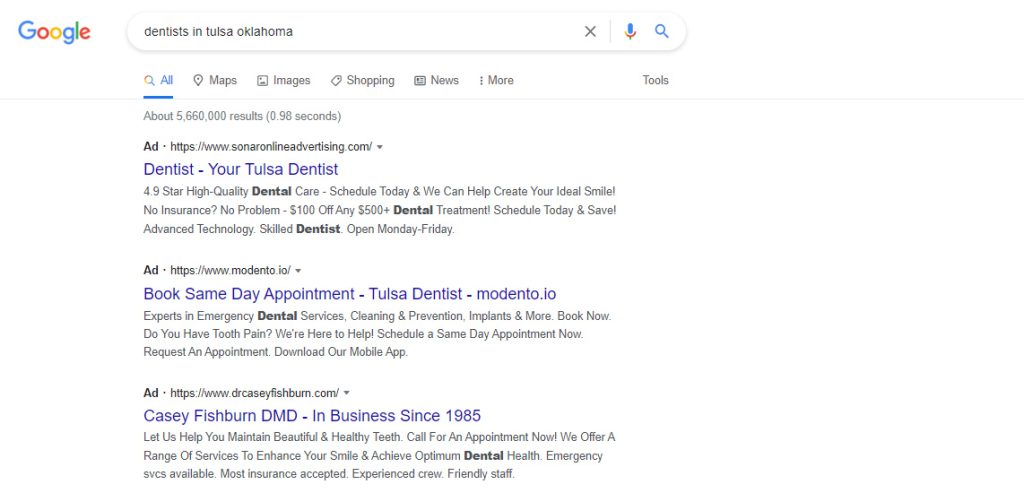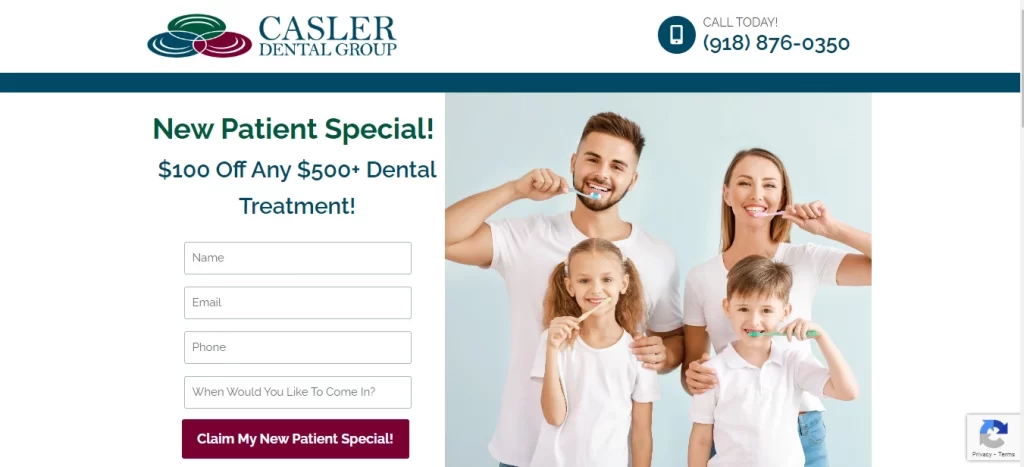Want to attract new patients to your dental practice but not sure where to start? Regarded as one of the prominent pillars of online digital marketing, pay-per-click (PPC) advertising for dentists can help attract and connect with new patients when they are actively searching for a dental practice online. In simple terms, PPC or pay-per-click is a unique internet advertising tool to direct traffic to websites in which an advertiser pays a publisher when the ad is clicked.
With increasing competition in the healthcare field, dental practices are looking out for different ways to drive new patient volume. With constant focus and correct implementation of optimization techniques, this digital marketing tool can help boost website engagement and improve overall revenue. When it comes to dental field, potential patients are driven to search for their dental problems and symptoms online to find valuable information quickly. Relying on the services of professional medical SEO companies can help implement an effective strategy to target and attract new clients.
Key Benefits of PPC Advertising for Dentists
Pay-per-click (PPC) advertising is an important starting point for dental practices looking to drive new patient volume through digital marketing strategies. However, PPC dental marketing can attract qualified leads to a practice only if those campaigns are well-optimized around the content that the targeted consumer groups are looking for when they search for a dentist. This may involve focusing on – easy scheduling options (online, phone etc.), readily available appointments and practices that accept new patients and accept a specific insurance provider.
Generally, ease and convenience are the top considerations when potential patients look for dentists online. Most searchers are looking for local dentists and ready to book immediately. One of the top benefits of PPC advertising for dentists is that they need to pay only when people click on ads. In addition, dental practices don’t have to wait for results. With PPC advertising, dentists can start driving qualified traffic to their website as soon as they launch them. A few benefits of using PPC advertising for dentists to market a dental practice include –
- Increase online visibility – PPC ads show up on search engines, social media platforms, and websites. Bidding for an ad is a great way for a dental practice to increase their visibility online.
- Gets a dental practice ahead of the competition – As paid search ads are always displayed in the top two or three positions, potential patients tend to see your practice first.
- Generate more patient leads – PPC ads can be used to introduce a dental practice to prospective patients within their geographical area. These ads can educate prospective patients about their services, special promotions and coupons to attract new patients to a practice.
- PPC Ads work immediately – While SEO (search engine optimization) is essential to build long-term visibility online, PPC ads can help a website show up right away. The process of setting up an ad, bidding on keywords, and going live can happen within mere hours. This in turn can help attract more prospective patients to a website and encourage them to contact a practice.
- Cost-effective – With pay-per-click dental campaign, you only pay when someone clicks your ad. This means wastage of budget on promoting services to an uninterested audience is not happening. Moreover, prospective patients who are interested or in need of dental services are directly funneled to your website.
How to Run a Successful PPC Dental Ad Campaign
Now that we have understood how PPC ads work and how they are beneficial to growing a dental practice, it is important to decide on the specific goal of PPC ad campaign. For instance, the PPC ad campaign goals for specific dental practices can be different. Some of the key goals include – introduce a dental practice to others within the community, increase traffic to your dental practice’s website and generate new leads. Therefore, it is important to choose one specific goal for each specific ad. Also, you need to choose a different goal for future ads. Here discussed are some of the key strategies to focus on while designing a successful PPC campaign –
- Choose the Right Keywords – The success of PPC strategies lies in the keywords used for the campaign. It is important to understand what keywords potential patients use when searching for dental services online. Based on that analysis, divide those keywords into groups that focus on particular services offered. Smart keyword use in PPC starts with a careful assessment of your area of business. The broader the keywords, the less targeted your ads will be. The more you narrow down your keywords, the more effective and targeted your PPC campaigns will be.For instance, if you are the only dental office or dentist within your geographical area, it is better to avoid a broad term like “dental office” or “dentists” as the chances will be less to come up in search results for terms like these. Narrow it down by deciding on the specific geographical area you will concentrate on. So, instead of a broad term, use “dental clinic in Brooklyn” or “Las Vegas dental office.” In addition, microfocus keywords with specific services a dental practice is specialized in. For instance, use the keywords “teeth whitening expert in Las Vegas” or “San Diego dental implants.” With these keywords, your PPC ads are much more likely to come up every time when there is a relevant search.
- Understand Google Ads Structure – Google helps marketers make sense out of their PPC campaigns through Google AdWords. AdWords has settings that will allow your practice to change your account and marketing campaigns. These campaigns will dictate the structure of your account.
- Create Custom Landing Pages – Create customized landing pages for each of PPC ads as these are the pages where you will send users who click on each of your specific ads. Text ads and landing pages should emphasize the same topic or services. For instance, if your PPC ad mentions cosmetic dentistry, your landing page should highlight the cosmetic dentistry services offered. In addition, landing pages should also include clear calls-to-action (CTAs) that encourage potential patients to take the next step and contact you to schedule an appointment. In short, creating custom landing pages will help to establish consistency and ensure that prospects don’t lose interest in your dental practice.
Image Source
- Target local traffic – Local targeting is an important aspect for dentists as this helps your ads to show up when people in your area search for dental services. By targeting a local audience, you can reach the most qualified prospects and avoid overpayment for PPC ads. In addition, local targeting can help prevent you from wasting your PPC budget.
- Optimize Ads for phone calls – Use PPC advertisements to generate phone calls. To maximize call-in leads, include your phone number in all advertisements. Set ads to only display the office working hours. This will ensure that all the calls are answered by a real person who can help turn prospects into patients.
- Use Ad extensions – Standard PPC ads only allow a limited amount of space. Ad extensions help provide more detailed information about your dental practice. For example, local extensions display an address, phone number, business hours and other key information. Sitelink extensions help to display links to multiple service pages instead of one landing page. These extensions will help you extend the reach of your PPC ads and attract even more patients.
- Understand Audience Demographics – Understanding audience demographics is an important aspect of PPC advertising. For instance, if you have a local dental office, set your demographics to focus on your local audience. Create ad campaigns to target your audience from every region. Fine-tune your location options by including or excluding people coming from different locations. Including your dental office or practice location and starting an advanced search can help enhance your targeting preference.
- Monitor Search Query Reports – Available on Google AdWords, Search Query reports will give you data on all the keywords included in your ad. This information will help you identify keywords that are driving more traffic to your paid ad campaign. You will also get insights on which keywords will get you more conversions. This report will also tell you about the negative keywords and help you narrow down your target audience.
Even though pay-per-click advertising for dentist may seem complicated, once you learn how to maximize your PPC efforts, these can seem to be a practical option. One of the top lead generation strategies for dental practices, PPC can help strengthen online visibility, increase traffic, and drive profitability. However, to get the best results, it is important to follow a practical approach while designing your dental advertising campaigns. Incorporating the right combination of keywords and continually working on these strategies can help get the most out of your PPC budget. An organic SEO company can help design the right PPC campaign to increase website visibility, traffic and conversions.






